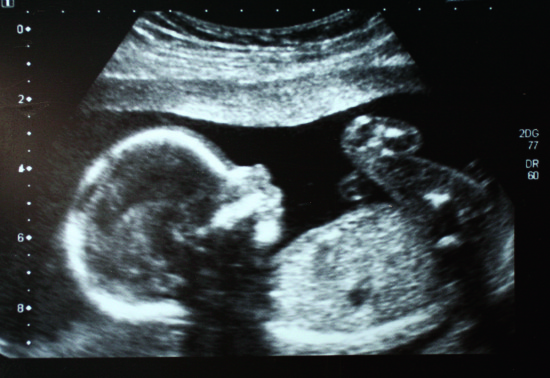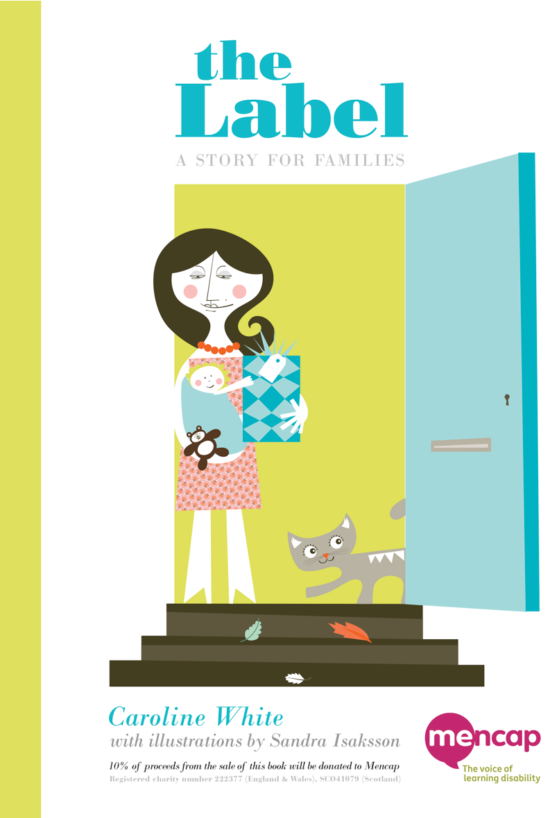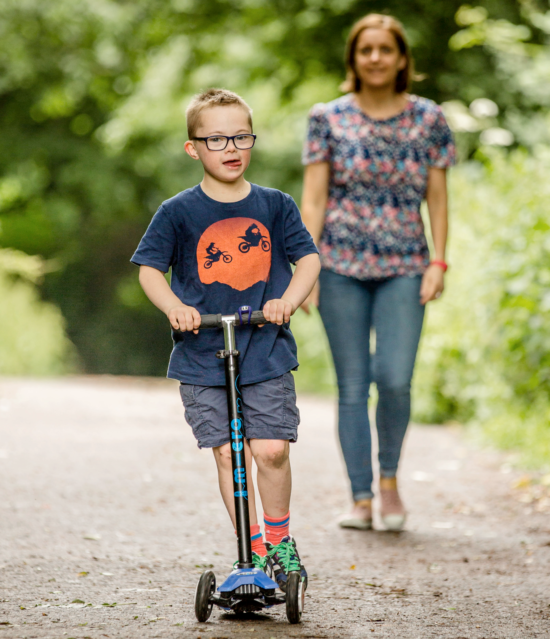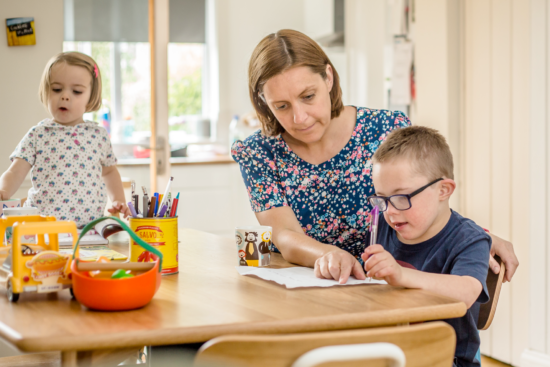Caroline White shares her experience of having a son with Down’s syndrome and her advice for other parents who have a diagnosis during pregnancy or after birth.
I had an easy pregnancy with Seb. He was my first baby, and at 34, I had worried a little that I might struggle to fall pregnant so I felt incredibly lucky that things happened quickly.
I remember at every appointment the midwife telling me what a strong heartbeat he had. I think those moments are so special as it’s your first experience of maternal pride.
I was pregnant with Seb in 2007 and, at the time, antenatal tests were only available on the NHS for women over the age of 35 (apart from the standard scans).

I can vividly remember a friend of mine, who was also pregnant, telling me that 34 is the most common age to have a baby with Down’s syndrome as it was the oldest age that a woman wasn’t tested.
Her comments filled me with fear so we paid to have a nuchal fold test privately. The results came back ‘low risk’, or ‘low chance’ as I now prefer to call it, at 1 in 700 and so no further tests were ever mentioned.
I mentally ticked it off my lists of things to worry about.
I was devastated with the news. I had had a dreadful labour, which was a shock after such an easy pregnancy. It seemed everything that could go wrong, did go wrong.
The midwife and paediatrician were talking about a chromosomal abnormality.
I was haemorrhaging and Seb got stuck and was in distress. When he was finally delivered, swollen and blue, I was petrified something was wrong, but once things settled, I assumed we were out of the woods.
At first, we weren’t really sure what the midwife and paediatrician were talking about as they were referring to a ‘chromosomal abnormality’. I was quite calm as I assumed it would just be something that could be sorted out with an operation.
But later that evening, all alone in my hospital bed, I decided to put the notes from Seb’s precious red notebook into Google
That’s when I found out. Line after line said Down’s syndrome and I can still remember feeling sick, full of panic and like I was holding my breath.
Some friends bombarded me with phone calls, others texted and said to call them when I was ready, some just disappeared altogether.
I remember one person sent me a card that said, “I’m sorry…” it was well meaning but was a horrible thing to receive.
Everyone reacted differently. My brother cried, something I had never seen before.
My mum was amazing, she was only ever upset that I was upset, and I can remember her saying to me “mark my words, that baby will be the centre of your universe”.
The ward I was in unfortunately limited visitors due to a noro virus outbreak (February baby!) and I remember wheeling Seb down to the ward window for my brother-in-law to see him.
“He’s beautiful” he mouthed through the window. That was a bittersweet moment which stands out.
He told me that Seb was still our little baby and we would always do the best for him.
And Simon, my husband, was incredible. He was very strong. I am sure the news was a massive shock to him too, but he never let it show, and he said all the right things.
He told me that Seb was still our little baby and we would always do the best for him. He also has a close friend who has a sister with Down’s syndrome so I think that helped him a lot. He allowed me to cry and held me up really.
We were in hospital for a week and then had the formal diagnosis. It was a total blur. Seb had arrived two and a half weeks early so I hadn’t even packed my hospital bag. We were already disorganised before the diagnosis!
I barely think about his diagnosis at all now and I certainly don’t feel sad about having him, I actually feel lucky.
I can remember the pain in my heart every second of every day. I just couldn’t believe it. Or that it had happened to me. I would wake up and slowly the reality would creep back into my consciousness and I would burst into tears all over again. Everything hurt, physically and mentally, I was struggling to feed him and my hormones were all over the place.
The house had a constant stream of visitors, people desperate to see us and meet Seb, but also people checking we were ok. Every day I hurt a little less as I got used to our routines and all the information I was trying to take in. It was overwhelming.
Now I realise that a lot of that is just becoming a new parent. With each day that passed I noticed something else about my baby, he would smile, or laugh, or reach out for a toy, rollover and the diagnosis started to become inconsequential as I fell in love with Seb.
When Seb was born and we were given his diagnosis, I threw myself into researching Down’s syndrome. Everything I read made me feel worse.

Books and leaflets that listed all the possible health problems he might face, the physical characteristics commonly seen in people with Down’s syndrome and about learning disability.
It made me map out what our life was going to be like. The reality could not be further from that bleak vision.
All the information was very clinical and black and white and I wanted to write my book to breathe a bit of colour into a diagnosis and to try and tell other new parents not to be bound by the textbooks.
A diagnosis is obviously important as it allows health to be proactively monitored and explains certain behaviours, as well as help us understand the way people with Down’s syndrome think and learn, but what a diagnosis can also do is create wrong assumptions and pigeonhole.
No I don’t think so. I do wish with all my being I could hold him in my arms again today as a newborn with the genuine joy and pride I feel today.
I feel so guilty for ever thinking he was something to be sad about and I do regret the precious early days I missed out on needlessly worrying and feeling sad.
I get many emails from new parents who have just received a diagnosis and I always say the same thing. Remember that your baby is still your baby.

Down’s syndrome is a very small part of who they are. They will grow up to be a reflection of their family and upbringing and will be completely different to anyone else with Down’s syndrome.
Seb, for example, is outgoing, sporty and loves football, but another boy we know with Down’s syndrome is shy and musical.
I also tell other parents that one day they will wonder why they were so upset – and I know they won’t believe me but I also know that that will happen! I love following the blogs of mums who have contacted me.
Our paths all follow a very similar direction in some ways.
I would suggest they seek out blogs from other parents. When I had Seb, social media was still in its infancy so I didn’t have this as a resource. But many parents out there are writing about what life is really like – the highs and lows.
It’s refreshing to read real stories and not stuff in a leaflet that a medical professional has written who possibly has had no first-hand experience in bringing up a child with Down’s syndrome. But also remember that all kids are different, including kids with Down’s syndrome, so don’t assume your life will be like theirs.
The Down’s syndrome association and Mencap are two very important and proactive charities, and there are some fantastic videos on YouTube, such as Dear Future Mom, which give a positive insight without be overwhelming. Obviously, I would send them my book too!
From 2018, women will be offered a non-invasive prenatal test (NIPT) screening test as an alternative to the current invasive tests. I think it’s great that a test has been developed that minimises the risk of miscarriage but testing is still being administered with a negative and bleak overview of what Down’s syndrome means.
There is an out-of-date perception that doesn’t reflect the full and rewarding lives that people with Down’s syndrome live today.
I genuinely cannot believe that anyone would think he shouldn’t be here; he has enriched my life, and many others, beyond measure.
The way information is delivered can lead people to make a decision to end their pregnancies. This really does sadden me.
I know before I had Seb I had an outdated view of Downs’s syndrome. Today, I genuinely cannot believe that anyone would think he shouldn’t be here; he has enriched my life, and many others, beyond measure.
He has shaped me as a person, for the better, and I can’t imagine our lives without him. I am pro-choice, up to 12 weeks, for whatever reason a woman wants to terminate her pregnancy, but it needs to be an informed choice.
Another issue that saddens me is that currently you can terminate a pregnancy on the basis that the baby has Down’s syndrome up until 39 weeks and six days. This is because a baby with Down’s is classed as ‘severely disabled’ in utero.
If you could see Seb playing football, reading and writing or engaging with his friends and siblings, you would agree too that this is wrong.
I think our family is really typical. Seb and his younger brother both go to the same mainstream school and their sister starts in September. Seb’s teacher reckons Seb is the most popular kid in his class, if not school.

Our days are filled with after school rugby, tennis, football, swimming and choir. Trips to the cinema, family roasts and parties at the weekends.
Seb is a massive Chelsea fan, he is lucky enough to get to a match with his Dad every now and then, and we are just planning his 9th birthday party at an indoor ski slope.
One thing I have learned over time is that my hopes and aspirations for all my kids are the same. That they are all happy and safe and grow up to be decent human beings and, so far, so good.
All photos of Caroline White and family courtesy of Hanri van Wyk.
Caroline’s book ‘The Label: A Story for Families’ is published by Ivy Press, RRP £6.99 (10% of proceeds from the sale will go to Mencap)
The NHS gives information on screening for Down’s syndrome and also recent developments in antenatal investigations, known as non-invasive prenatal testing.
Mencap supports the 1.4 million people with a learning disability in the UK and their families and carers. Mencap fights to change laws and improve services and access to education, employment and leisure facilities, supporting thousands of people with a learning disability to live their lives the way they want.
The Down’s Syndrome Association is a national charity with over 20,000 members and focuses on all aspects of living successfully with Down’s syndrome.
Continuing Pregnancy with a diagnosis of Down’s Syndrome – A guide for parents is a booklet for those who have had a pre-natal diagnosis of Down’s syndrome and are continuing pregnancy, including personal stories from parents as well as information about the condition.